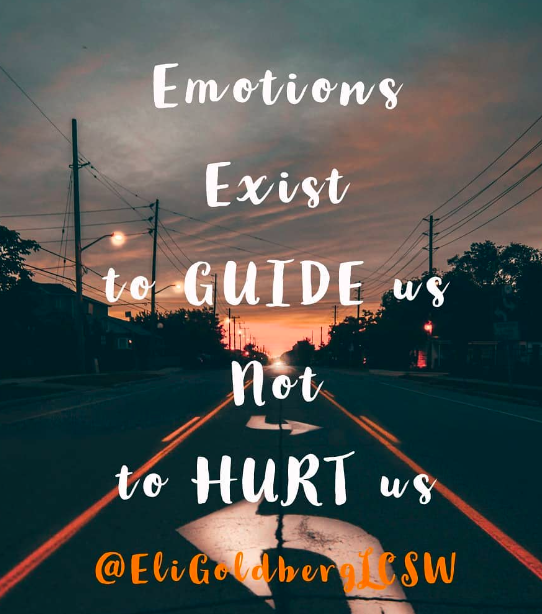Eli Goldberg's style
💙 Warm 😃 Humorous 🙏 Spiritual 🧘 CalmWhy Eli Goldberg chose to be in the helping profession
I became a Psychotherapist because of my personal experiences with growth and healing, which taught me the importance of the therapist's role in helping others. My preferred approach to Psychotherapy is Humanistic, which emphasizes empathy, respect, and compassion towards clients. Like Irvin Yalom, I see myself and my clients as "Fellow Travelers" on the journey of life. To quote Ram Dass, "we are all just walking each other home," and I find this sentiment deeply meaningful in my work. Ultimately, my decision to enter the helping profession was motivated by a desire to make a positive difference in the lives of others.
Eli Goldberg's approach
My approach to therapy is based on creating a safe and welcoming space for clients to explore their inner selves and find solutions to their challenges. I draw from various therapeutic modalities such as cognitive-behavioral, mindfulness, somatic, and psychodynamic to tailor my approach to each client's unique needs. I believe that every person has the potential for growth and healing, and I work collaboratively with clients to help them achieve their goals.
What you can expect from sessions with Eli Goldberg
During our therapy sessions, you can expect a compassionate and non-judgmental approach from me. Together, we will explore your thoughts, feelings, and behaviors in a safe and supportive environment. I will help you develop practical skills to cope with stress, anxiety, depression, and other challenges. My goal is to empower you to make positive changes in your life and improve your overall well-being. You can expect our sessions to be a mix of serious work and lighthearted moments as we strive toward your goals.
Eli Goldberg's experience working with the Jewish community
I have extensive experience working with the Jewish community, having worked at various organizations in New York and currently in Israel. During my time in NY, I worked with organizations like Our Place NY, Project Extreme, BINA, and HASC, and also worked at Interboro, where many of my clients were Orthodox Jews. Currently, in Israel, I work primarily with gap year and yeshiva students in my private practice, as well as at the Dvir Institute for Behavioral Health and United Hatzalah. Working with the elderly, including Holocaust survivors, at United Hatzalah has been particularly rewarding. Additionally, I volunteer with Hatzalah in the PsychoTrauma and Crisis Response Unit. I am deeply grateful for the opportunity to make a positive impact on the mental health of the Jewish community through my work.
Approaches
- Acceptance and Commitment Therapy (ACT)
- Attachment-based
- Breathwork
- Cognitive Behavioral Therapy (CBT)
- Dialectical Behavioral Therapy (DBT)
- EMDR
- Expressive Arts Therapy
- Family Therapy
- Inner child work
- Internal Family Systems (IFS)
- KAP
- Massage Therapy
- Mindfulness and Meditation
- Motivational Interviewing
- Person-Centered Therapy
- Psychoanalytic Therapy
- Psychodynamic Therapy
- Somatic Therapy
- Supervision Services
- Yoga
Concerns
- Abuse/Violence
- Addiction
- ADHD
- Anxiety
- Bereavement & Grief
- Crisis Intervention
- Dating
- Depression
- Dissociative disorders
- Drug/Substance Abuse
- Emotion regulation
- Gender Identity Issues
- Insomnia & sleep issues
- LGBTQIA, gender, & sexuality topics
- Life purpose and meaning
- Mood Disorders
- Obsessive compulsive disorder (OCD)
- Oppositional defiance disorder
- Panic attacks/panic disorder
- Parenting
- Personality issues & disorders
- Psychotic disorders
- Relationships
- Religious Identity Issues
- Self-Harm/Suicidality
- Sexual health & dysfunction
- Skin picking (excoriation)
- Stress management
- Transitions & Change
- Trauma
- Trichotillomania
Languages spoken
EnglishAges
Adolescents (13-18) Adults Elders (65+)People I work with
Individuals FamiliesPersonal religious affiliations
Frum open mindedJewish community experience
ExtensiveLicensed to work in
Florida, Israel, New YorkNearby areas within a short commute to my in person office
Jerusalem10 years in practice
Licenses
- LCSW 2018. License number 087334, TPSW593, 41294
- CASAC 2014. License number 31043
Degrees
- MSW by Long Island University 2014
- BTL by Lev Aryeh Yeshiva 2010
Certificates
- EMDR Trained
- Somatic Experiencing Trauma Institute Level 2
- Sensorimotor Psychotherapy Level 2
Trainings
- Psychoanalysis and Addiction by Manhattan Institute
- Psychedelic Integration by Fluence Institute
- Trauma Informed ACT
- IMHATT Integrated Mental Health Addictions Treatment
- CSAT Certified Sex Addiction Therapist Candidate
Average costs per session
$200 - $250
Payment Methods
- Sliding Scale
- Free consultation

 In-Office
In-Office


